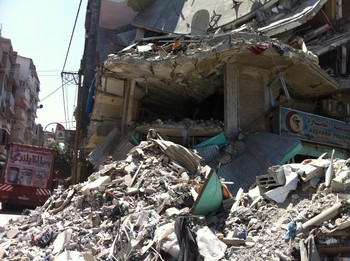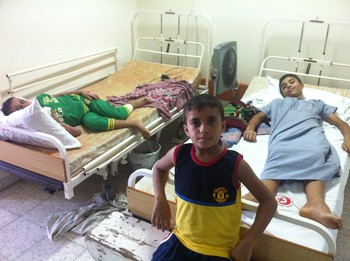Editor’s note: The Rev. Kate Taber is a mission co-worker for the Presbyterian Church (U.S.A.). She is serving in Israel/Palestine as facilitator for peacemaking and mission partnerships. On Aug. 11, she had the opportunity to travel to Gaza and tour the Al Ahli Arab Hospital, a PC(USA) partner. To read a PNS interview with Taber about her experiences with the recent conflict in Gaza, click here.
Al Ahli Arab Hospital is the oldest hospital in Gaza, established in 1882 by British Christian missionaries. It is also the only Christian healthcare institution in Gaza, where there are only about 1,500 Christians total. The Presbyterian Church (U.S.A.) has been a longtime partner of the hospital, which is a mission of the Episcopal Diocese of Jerusalem.
Hospital director Suhaila Tarazi says of the hospital’s mission, “We are here as an instrument in the hands of God to show the love of Jesus Christ for all people. We are proud that in all conflicts, this hospital was there to eliminate the suffering of the injured, the poor, and to help those in need of a compassionate heart. This hospital will continue to be a place of reconciliation, of love. The history of this hospital tells the story that we are all children of one God — whether we are Christian, Muslim or Jewish.”
I had the incredible privilege of spending a handful of hours in Gaza during a rare ceasefire. It is difficult to get into Gaza in normal times. The only people allowed in are diplomats, UN staff, aid workers and a handful of others connected with organizations that have branches or staff in Gaza. None of the Palestinians I know can go. Most church workers cannot. It is even more difficult in times of war, as the checkpoint can close with little notice and fragile truces can explode into more rounds of fire. I was lucky enough to have the help of the Mennonite Central Committee and the hospital itself, and fortunate that the current ceasefire held so that I could get safely in and out.
I used these precious few hours to visit Al Ahli Arab Hospital, where staff are struggling to ease the suffering brought on by Israel’s Operation Protective Edge.
At the hospital, I met Tarazi, as well as Maher Ayyad, medical director. Tarazi affirmed this war has been the worst yet.
“This war targeted not only people, belongings, lives, but the entire economy they depend on — farms, factories, infrastructure, electricity, water supply,” she said.
Ayyad told me that the number and extent of the injuries for each person made this war different as well. During previous wars, he said, people might come in with a fracture or a burn. Now, they are coming in with a broken bone, multiple extensive burns and internal bleeding. He also said that more than before, his patients have been the only remaining member of their family. The trauma is unimaginable.
The hospital is small, with a normal capacity for 50 beds, though it has added several more during this war. The hospital also increased its staff by 10, but leaders say they need 10 more. Staff work 24-hour shifts, with 24 hours off. The rest of the staff continue to work around the clock, though Tarazi said it is often difficult and dangerous for them to get to work.
I was told that at that point in the day, around noon, their clinic, staffed by three doctors and three nurses, had already seen 113 patients. The burn unit had seen 30. The hospital is short of medicine, medical supplies and fuel. It is using a donation of 10,000 liters of fuel, costing $20,000, which will last 10 days.
Many windows have been blown out from the force of nearby shelling. Shrapnel has damaged the building, creating holes and cracks in the walls. Pieces of shrapnel entered some patients’ rooms, causing some to refuse to stay, deciding not even the hospital was safe. Shrapnel also damaged the steam pipe supporting the hospital’s laundry room. No replacement pipe can be found in Gaza, where it is forbidden to make or import it. So, the hospital waited days for a permit from Israel to get the replacement pipe.
I was given a tour of the burn unit, outpatient clinic and wards used to house patients with all kinds of wounds. I met a young woman from Shuja’iyya with a broken femur whose home was destroyed and along with it a dozen members of her family. I met a young man with a colon injury, moaning on a bed, whose family was celebrating because he got permission to be transferred for treatment in Turkey. I peeked into a room housing two extended families of burn patients who were on the mend. The extended families of most patients are staying in their room with them. I met a boy around 13 years old who told me proudly he had escaped death. He was visiting his grandmother when shelling struck a nearby house. He was very frightened, he said, but ran away, breaking his leg and slicing open a vein on the back of his ankle.
I met a little boy named Mohammad along with his two brothers. Mohammad bragged he got better first. Tarazi told me his mother, grandmother, aunt and aunt’s family all died in the strike that injured them. As we left the room, we overheard Mohammad asking his father, “Are we going home tomorrow?” “They have no home to go back to,” Tarazi told me.
I was asked to take a picture of a small boy in a wheelchair, covered in burns. His mother did not want to be in the picture, so a doctor came to stand with the child. He started crying. “He is afraid of people in white coats now,” Tarazi said.
As shocking as the number and intensity of the injuries are now, Tarazi says the needs will only grow: “There will be public health problems. We have a lot of cases of meningitis, related directly to the living situation of the people. Also scabies, diarrhea. You see 1,000 or 1,500 living in one school. There is no proper water supply. There is no proper sewage. Other needs are the psychosocial needs. It will be a big problem in Gaza. Also, those who have lost their extremities will need a long time for treatment. Also, chronic cases have been neglected. Also, we already had a problem of malnutrition; what about now? All aspects of life are affected. It will take a long time to restore normal life.”
The lasting impact of the war will go beyond health problems.

A toy truck hangs precariously off the roof of a building destroyed during shelling in Shuja'iyyia, in the neighborhood surrounding the hospital and one of the areas most heavily hit. —Kate Taber
Ayyad said, “The problem with this war is it will not finish when they start the ceasefire. The problem will start after. Because people who are living in shelters, they will start to go back to their houses and they will not find any house to live in. People will start to look for some of their missing people and not find them. People who lost their extremities will realize it. The lady who lost her husband will be a widow and she will suffer. The child left without parents will suffer. Those who had severe injuries need long-term support. The suffering will start after the ceasefire. That’s where Palestinians are in need of international help. Unemployment before this war was 40 percent; after this war and the destruction of almost all factories in Gaza, unemployment will increase. Schools will be delayed, and universities. Hospitals close.”
I asked Tarazi how she hoped this conflict might end. As she answered, she spoke firmly, unequivocally, her jaw set. “It is about time that the Palestinians have the right to be free. Free the captives. Why are the 2 million kept as hostages in the tiny Gaza Strip? Why? Why should people suffer from collective punishment by the Israelis? If they are talking about human rights and a two-state solution, that should have been started a long time ago. Why wait until now? Children of Abraham, whether they are Jews or Arabs, they deserve a good life. Not to keep part of them as captives, and the others with the right to freedom. It’s about time this conflict should be ended. Enough suffering. Enough bloodshed. This is an opportunity for all the leaders to sit together and solve this situation.”
Tarazi and Ayyad were intensely grateful for all the ways people have supported the hospital, saying, “Support of any means keeps this hospital going in our mission of healing. Any support — prayers, thoughts, advocacy, money — helps us eliminate the suffering of the innocents.”
I left then, hurrying to get back to the checkpoint before it closed. On my way out of the hospital, I saw the staff passing out cases of bottled water to members of the community. I stepped over broken window glass. I saw again the steady stream of people walking through the gates headed to the clinic for treatment. I said a prayer of gratitude for the grace and strength of Tarazi, the determined perseverance of the entire staff, and the smiles on the faces of those who had endured what for most of us is only nightmares. May Tarazi’s hopes become real — an end to the suffering and bloodshed and a solution to this conflict that provides a good life for all.

